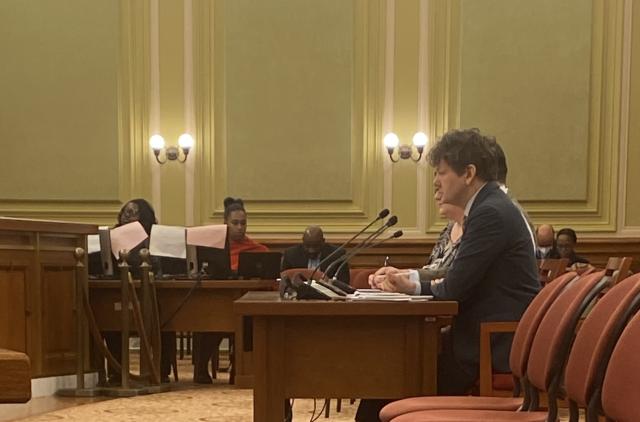Kean Assistant Professor Testifies on Housing in Washington, D.C.

A Kean University assistant professor of sociology testified before the Washington, D.C. City Council recently in support of a social housing bill that could serve as a national model for solving the affordable housing crisis.
H. Jacob Carlson, Ph.D., an academic researcher and expert on housing policy, was asked by the D.C. Council's Committee on Housing to provide expert testimony on the bill supporting social housing, which is housing provided through the government for people of low and moderate incomes.
“Our housing crisis is getting worse, and many of our social problems originate in the lack of secure, affordable housing,” Carlson testified at the hearing last month. “This proposal addresses those problems upstream. Twenty years from now, what will we wish we had done, even if it was costly?”
The proposal would create a city office to oversee the development of mixed-income housing for residents earning below the median family income. The bill is still being considered; Carlson said he may be called on to testify again in the future.
A faculty member in Kean’s Department of Political, Social and Cultural Sciences and a former post-doctoral researcher at Brown University, Carlson is an urban and political sociologist who focuses on democracy, housing and changing cities. He has researched social housing specifically for about six years.
Kean Provost and Senior Vice President for Academic Affairs David S. Birdsell, Ph.D., said Carlson’s work is emblematic of Kean’s role as New Jersey’s urban research university “to understand a problem in all of its dimensions, apply the highest quality of scholarship to developing solutions, and help responsible parties, in this case, the D.C. city government, make those solutions work.
“Creating safe and affordable housing is one of the key challenges facing every urban area in the country,” Birdsell said. “Dr. Carlson's work addresses those needs directly, providing evidence for solutions that resonate not only in New Jersey but throughout the country. I am delighted that he has been able to share his work with the D.C. city government.”
Carlson said both the U.S. and New Jersey were experiencing a lack of affordable housing prior to the Covid-19 pandemic, then “the pandemic made a bad housing crisis worse.”
Between 2019 and 2022, there was a 12 percent increase in households who paid more than half of their gross income to their landlords, with the rate increases worse in New Jersey than the national average, he said. Across the U.S. in 2022, he added, half of renters paid a third of their income in rent in 2022, and a quarter of renters paid half.
Social housing, which is often government-created, high-quality housing that integrates families of different income levels, is found in many European cities, and proposals have cropped up in a handful of cities and states across the U.S.
An expert from Vienna also testified on the D.C. proposal.
Several years ago, Carlson was the co-creator of a proposal for a federal Social Housing Development Authority, which would buy distressed real estate and transfer it to community organizations for long-term affordable housing. He co-authored an opinion piece in The New York Times on that proposal in March 2021.
Carlson said the U.S. has a long history of affordable housing solutions programs that have yet to solve the housing crisis, but policymakers are starting to think differently about what they can do.
“Does that mean we have to do it better?” he asked. Examples from around the world show that “it’s not impossible.”